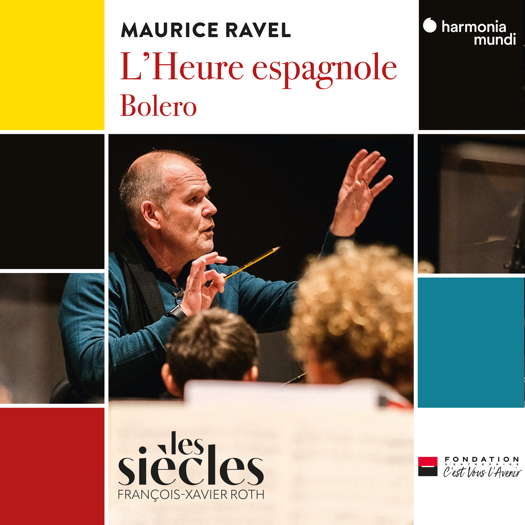 FEEDBACK: She said WHAT? Read what people think about our Classical Music Daily features, and have your say!
FEEDBACK: She said WHAT? Read what people think about our Classical Music Daily features, and have your say!
- Kazakhstan
- Alan Curtis
- Macedonia
- Theodore Kuchar
- People's Republic of China
- paladino music
- Artificial General Intelligence
- Aysgarth Falls
 SPONSORED: Ensemble. Melting Rhapsody - Malcolm Miller enjoys Jack Liebeck and Danny Driver's 'Hebrew Melody' recital, plus a recital by David Aaron Carpenter.
SPONSORED: Ensemble. Melting Rhapsody - Malcolm Miller enjoys Jack Liebeck and Danny Driver's 'Hebrew Melody' recital, plus a recital by David Aaron Carpenter.
All sponsored features >>

Ticking All the Boxes
GEOFF PEARCE is delighted by a new recording of two Ravel works
'A thrilling orchestra, inspired direction, a great cast of singers, two Ravel masterworks, sumptuous recorded sound and a most informative booklet ...'
I was excited to review this disc. Les Siècles directed by François-Xavier Roth grabs my attention at any time, and I have to admit a fondness for this group that performs music on instruments of the period, in this case Maurice Ravel's first opera, L'Heure espagnole - a short opera that is one of my favourites. To be perfectly frank, even though I admire Ravel's orchestrating skills, Bolero tends to irritate me a bit, so I seldom listen to it, but to hear it played on the instruments that Ravel would have conceived it for, and heard, is really well worth listening to. The accompanying booklet mentions all the instrumentalists and brass and woodwind instrument details, and there is also an interview with the conductor who shares his insight - a very welcome addition to the recording itself.
L'Heure espagnole was written quickly in 1907 for the vocal score and Ravel completed the orchestration in 1909. The plot is basically a situation that involves a clockmaker, his wife and a couple of the wife's suitors. It is a rather ridiculous story, and Ravel creates a vocal style in which the cast sings, without seemingly being seen to do so. It is quite unlike the style of composers such as Schoenberg and the 'sprechgesang' that he was developing around the same time. The orchestral forces to some extent imitate this, but also have to provide atmospheric effects of their own.
Listen — Ravel: Introduction (L'Heure espagnole)
(HMM 905361 track 1, 0:59-1:40) ℗ 2023 harmonia mundi musique sas :
The programme booklet explains how Ravel applies this very well. This has long been a work that I have loved a great deal. Do not look for long arias that are present in other operas of the period, but more, a vocal language the follows speech. The characteristics of each of the five characters is vividly brought to life.
Listen — Ravel: II était temps, voici Gonzalve ! (L'Heure espagnole)
(HMM 905361 track 5, 0:30-1:17) ℗ 2023 harmonia mundi musique sas :
There is no chorus but all five singers are brought together for a masterly quintet at the last scene. This is truly imaginative and original, revealing Ravel at his best - a work to be savoured.
Listen — Ravel: Un financier ... (L'Heure espagnole)
(HMM 905361 track 24, 1:35-2:30) ℗ 2023 harmonia mundi musique sas :
The soloists - mezzo Isabelle Druet, tenors Julien Behr and Loïc Félix, baritone Thomas Dolié and bass Jean Teitgen - are all very fine and the orchestra provides a sumptuous atmosphere that showcases Ravel's orchestration and depiction of scenes. I have another recording of this work somewhere in my collection that I often played, but this one is even finer.
Bolero was composed for the Ida Rubinstein ballets in 1928 and first performed in concert the following year in New York. Early performances of the work rather angered Ravel because it was either taken too fast (such as by Toscanini) or liberties were taken with the tempi - ie Mengelberg. The composer's intention was that the work should be strictly at one tempo from beginning to end, and he later added that the tempo marking would be ideally sixty-six beats per minute.
I think we probably all know this work very well, so often has it been performed and widely used in many settings. It is without doubt a masterpiece of orchestration. It was never a work that I particularly liked as a youngster but I have come to like it much more as I have become more ancient. I have to say that I enjoyed this recording very much, partly because I love the sound of French bassoons, but also because the overall effect is remarkable in its clarity, and the characteristics of each instrument, as it is added, are perhaps more markedly apparent than on many other recordings, where such detail can be easily obscured.
Listen — Ravel: Bolero
(HMM 905361 track 25, 6:27-7:26) ℗ 2023 harmonia mundi musique sas :
There is a building excitement over the course of the whole work, and it seems to me that many recordings peak too early. I find there is considerably more colour in the orchestral palette than on many other recordings. This performance has totally convinced me. It is beautifully controlled and tight, and the orchestral registration so colourful. (Very often it can be too homogenous to be truly effective.)
Listen — Ravel: Bolero
(HMM 905361 track 25, 9:17-10:17) ℗ 2023 harmonia mundi musique sas :
A thrilling orchestra, inspired direction, a great cast of singers, two Ravel masterworks, sumptuous recorded sound and a most informative booklet: this new release ticks all the boxes for me.
Copyright © 2 June 2023
Geoff Pearce,
Sydney, Australia



